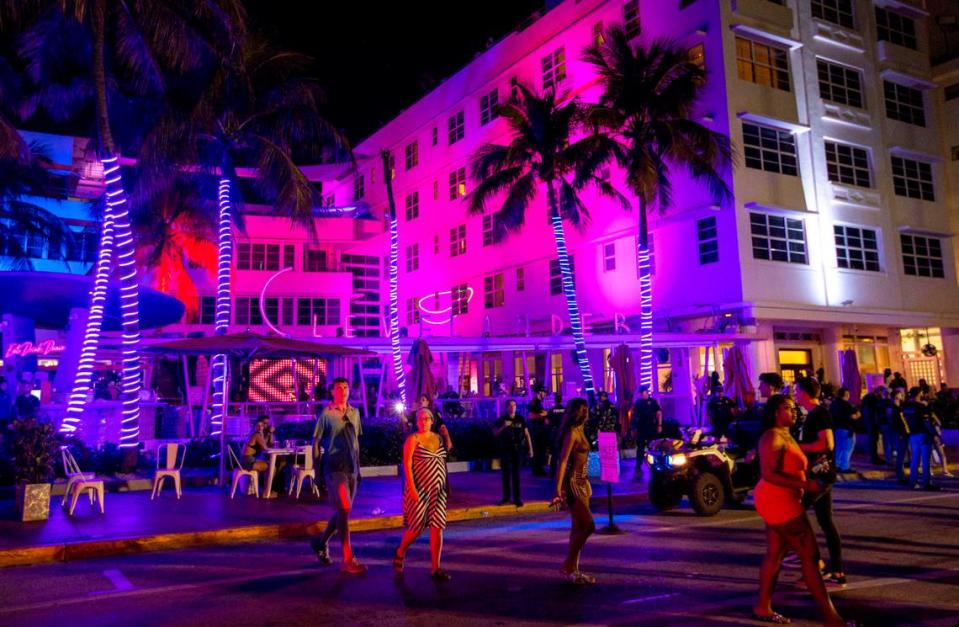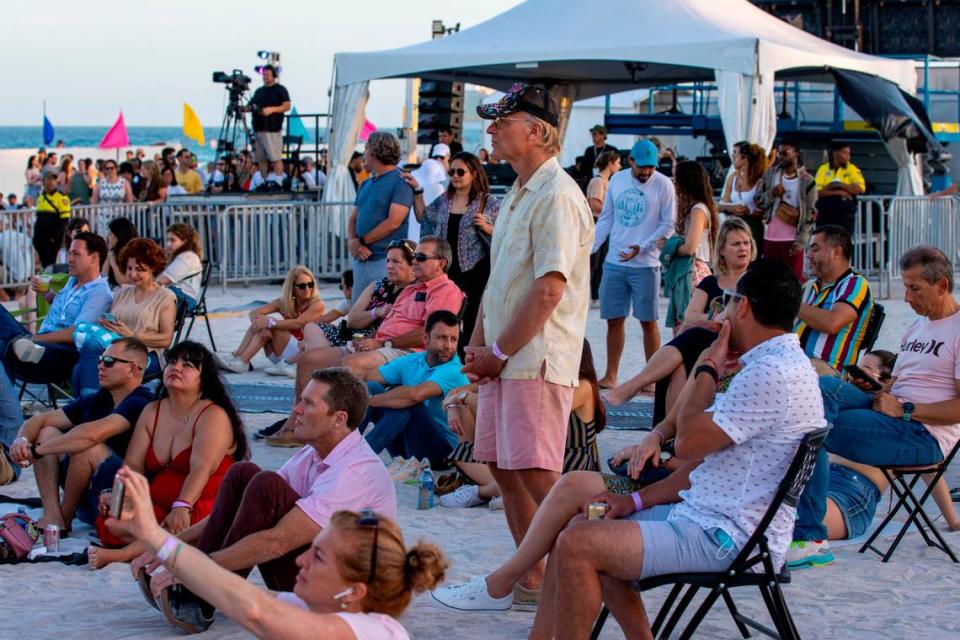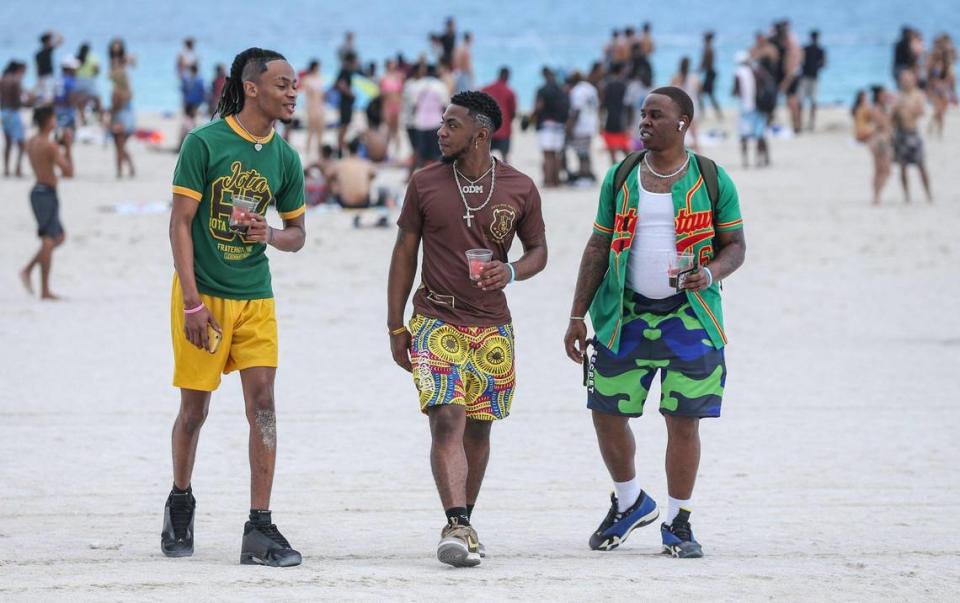‘Only emergency is that Black people are on the Beach.’ Critics blast spring break curfew
Local governments in Florida rarely declare states of emergencies.
Miami Beach, using the standard of “clear and present danger of a riot or other general public disorder,” has previously employed such declarations for hurricanes, a global pandemic and the catastrophic collapse of a condo tower in neighboring Surfside.
So the decision to elevate spring break crowd control into a community emergency has earned quick backlash from critics who charged that city leaders are overreacting, again, to large — mostly Black — crowds that have mostly been peaceful so far during this year’s gathering.
“The only emergency is that Black people are on the Beach,” said Stephen Hunter Johnson, a member of Miami-Dade’s Black Advisory Board, adding: “I don’t understand how this town has been doing spring break for at least 25 years and can’t figure it out.”
Michael Grieco, a state lawmaker and former Miami Beach commissioner, also said the step was heavy-handed: “The state of emergency is an abuse of governmental power, and it scares the crap out of me.”
Spurred by two shootings that injured five people, Miami Beach announced this week that it would institute a state of emergency and a 12 a.m. curfew to curtail crowds on South Beach.
READ MORE: New spring break curfew order also cuts off buying alcohol at stores in South Beach
The exact details of what powers Miami Beach plans to flex remain unclear — the government has yet to release a copy of the state of emergency order, which must be signed by City Manager Alina Hudak. So far, officials say the city will implement a midnight to 6 a.m. curfew, for areas between South Pointe Drive and 23rd Street, and set up traffic barricades to deter non-residents from entering some neighborhoods.
After 2 shootings, spring break gets curfew and state of emergency in South Beach
City officials on Monday said the state of emergency was necessary because of the two shootings over two nights. “There are cowards out there toting guns,” Hudak said during Monday’s press conference.
Miami Beach commissioners, during Tuesday’s commission meeting, voiced support for extending the curfew through at least Monday. “It’s literally by the grace of God that we haven’t had a tragedy in our city. I can’t think of a more fitting public safety emergency than this one,” Commissioner Steven Meiner said.
Initially, Miami Beach’s police chief said officers would set up a checkpoint entering South Beach to turn away non-residents or people who weren’t staying in the city. But with the city determining that checkpoints might not be legal, Chief Richard Clements backed away from that plan on Tuesday, saying officers will instead tell crowds to leave or go back to their hotels.

The declaration is but the latest escalation in the city’s larger campaign to tamp down the partying that for years has defined South Beach’s nightlife. Last year during spring break, with a state of emergency in effect because of the COVID-19 pandemic, rowdy crowds vandalized property, jumped on police cars and blocked streets to party.
That later spurred the Miami Beach City Commission to pass a controversial law that gave cops greater power to arrest people who get too close to them, a law that is now the subject of litigation over its constitutionality after it was used to arrest mostly Black people filming officers. As part of its tough-on-crime approach, the commission has also expanded its municipal prosecution program.
And, in its most visible effort, Miami Beach has sought to curtail booze in the entertainment district. In the past year, in a lawsuit brought by the famed Clevelander hotel, Miami-Dade Circuit Judge Beatrice Butchko has twice struck down temporary bans on liquor sale after 2 a.m.
Grieco, the former commissioner, described the optics of the state of emergency order and curfew as “terrible.”
“It can be interpreted as a way to do an end-around on the recent order by Judge Butchko,” Grieco said.
This month’s crowds — and racial tensions between residents and mostly Black visitors — are nothing new. Since the early 2000s, mostly Black crowds have flocked to South Beach for hip-hop events during the holiday Memorial Day, leading to criticism of heavy-handed police tactics.
But even then, city officials never instituted a state of emergency. And this year, officials vowed to take a softer approach, hiring social-media influencers and instituting a concert series that included acts such as Juanes and Alanis Morissette.

“We decided this year we wanted to welcome visitors to Miami Beach rather than have too much of an authoritative or dictatorial tone,” Matt Kenny, the city’s assistant director of marketing and communications, said in January. “We wanted to welcome them first and foremost to Miami Beach, make them feel welcome in our community while promoting local offerings and reminding them of our regulations to enjoy the city safely.”
Since the end of February through last weekend, the measures had largely been working, said members of Miami Beach’s Black Affairs Advisory Committee.
“Everything I’ve observed has been peaceful, just kids trying to have a good time, that’s all I’ve been seeing,” said Melba Pearson, a civil-rights lawyer and committee member who was speaking as a Miami Beach resident.
Pearson said she thought the concert series, Goodwill ambassadors and lower arrest numbers had showed progress. But she was dismayed when the city announced the curfew in response to the two shootings.

“It’s an absolute overreaction,” Pearson said. “Not to trivialize people being harmed or shot, but you have to have a balanced approach to issues of criminal justice and law enforcement.”
Not everyone is against the curfew.
Glendon Hall, who lives on Miami Beach and chairs the advisory committee, said he’s on board with the curfew.
“I understand the issues the city is facing with the crowds and the shootings that have occurred,” he said. “A shooting with these crowds and the first instinct of everyone is to run and start a stampede. For me, as a longtime resident, there has to be something done.”
And Hall said, if the curfew is handled properly, there aren’t likely to be many issues. He suggested telling volunteer “Goodwill Ambassadors” to tell the partiers to disperse, instead of cops in riot gear, for instance.
“It can be done,” he said. “I was there last year. And as long as you don’t send a damn SWAT truck, it’ll work.”
Miami Herald staff writer Martin Vassolo contributed to this story.

